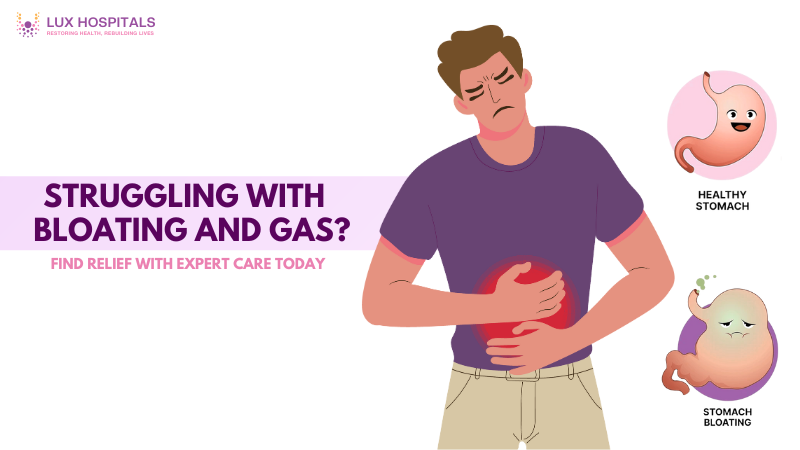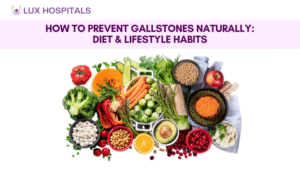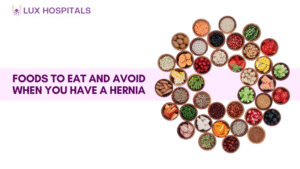Bloating and Gas: Causes, Prevention, and When to See a Doctor

Bloating and gas are common digestive issues that can affect anyone, often leading to discomfort, embarrassment, and disruption of daily life. While occasional gas is normal, persistent or excessive bloating and gas can signal underlying causes that may require attention. Understanding what leads to these symptoms can help you manage and prevent them effectively. Bloating and gas can turn a good day into an uncomfortable one. Understanding what’s causing it is the first step toward lasting relief and better gut health.
Impact of Lifestyle Habits on Bloating and Gas
Your diet is one of the most significant contributors to bloating and gas. Foods high in fiber, sugar alcohols, or difficult-to-digest carbohydrates can lead to excess gas production. Making mindful food choices and keeping a food diary can help you identify triggers and reduce discomfort over time. Below are the top 10 causes of bloating and gas, and tips on reducing them for a healthier, more comfortable life.
1. Eating Too Quickly
Eating too fast tends to cause you to take in more air, which may result in gas and bloating. Rapid eating frequently leads to overeating since it doesn’t allow your stomach enough time to tell you when you’re full. To enhance digestion and decrease air intake, chew gently and deliberately.
2. High-Fiber Foods
Fiber is essential for good health, but a sudden increase in fiber-rich foods can lead to bloating and gas. Beans, lentils, cabbage, and broccoli are notorious for producing gas during digestion. Gradually increasing fiber intake allows your gut to adjust and reduces discomfort.
3. Carbonated Beverages
Soda, sparkling water, and beer contain carbon dioxide, which gets trapped in your digestive system. This can cause bloating and gas, especially if consumed quickly or in large quantities. Consuming fewer carbonated beverages can considerably reduce abdominal distension.
4. Food Intolerances
Common intolerances include lactose (found in dairy) and gluten (found in wheat, barley, and rye). People with intolerances often experience bloating and gas after consuming trigger foods. Gluten is present in sugar-free goods and may upset the stomach. Recognize and eliminate problematic items from your diet.
5. Artificial Sweeteners
Sugar alcohols like sorbitol, mannitol, and xylitol are found in items without added sugar and may upset your stomach. These sweeteners ferment in the large intestine, producing bloating and gas. You can steer clear of these by reading food labels and identifying ingredients.
6. Constipation
When stool builds up in the intestines, it allows more fermentation and gas production time. This can lead to bloating and gas, often accompanied by abdominal pain. Staying hydrated, eating fiber, and exercising regularly can help relieve constipation.
7. Swallowed Air
Chewing gum, drinking through a straw, and conversing can cause you to swallow more air when you eat. This extra air builds up in your digestive tract, causing bloating and gas. Avoiding these practices can increase the comfort of your digestive system.
8. Small Intestinal Bacterial Overgrowth (SIBO)
An unnatural increase in the quantity of bacteria in the small intestine causes SIBO. These bacteria digest food particles too quickly, resulting in excessive gas and bloating. A physician can diagnose and treat SIBO using dietary modifications or antibiotics.
9. Gastrointestinal Disorders
Gas and bloating are often associated with conditions such as Crohn’s disease, celiac disease, or irritable bowel syndrome (IBS). These disorders affect the function of the intestines and may require ongoing care. If symptoms persist, get evaluated by a medical practitioner.
10. Hormonal Changes
Hormonal fluctuations, especially during menstruation, pregnancy, or menopause, can affect digestion. Many women experience bloating and gas during their menstrual cycle due to fluid retention and slower bowel movements. Hormonal balance and dietary adjustments can ease symptoms.
How to Prevent Bloating and Gas?
While occasional bloating and gas are normal, consistent symptoms can often be managed with a few simple lifestyle changes:
- Eat slowly and chew thoroughly.
- Avoid carbonated drinks and chewing gum.
- Identify food intolerances or sensitivities.
- Increase fiber intake gradually.
- Exercise regularly to promote digestion.
- Stay hydrated throughout the day.
When to See a Doctor?
You should consult a healthcare provider if any of the following accompany your bloating and gas:
- Persistent or severe pain: Continuous or sharp abdominal pain could indicate a more serious issue, like an obstruction or inflammation.
- Unexplained weight loss: Losing weight without trying may be a sign of malabsorption or a gastrointestinal disease.
- Blood in stool: This could point to internal bleeding, hemorrhoids, or more serious conditions like colorectal cancer.
- Frequent vomiting or nausea: Chronic nausea or vomiting can suggest a digestive system disorder that needs evaluation
- Changes in bowel habits: Sudden constipation, diarrhea, or changes in stool consistency can be warning signs of underlying conditions.
Conclusion
Understanding the causes of bloating and gas empowers you to make informed dietary and lifestyle changes. Whether it’s eating habits, food intolerances, or underlying conditions, determining the underlying reason is essential to obtaining relief. By managing your gut health, you can live a more comfortable and less bloated life. Do not hesitate to seek medical advice if, after making adjustments, you still suffer from gas and bloating. Your general health depends on the condition of your digestive system.
Frequently Asked Questions
The most common cause of bloating and gas is swallowing air or eating gas-producing foods like beans and cruciferous vegetables. Eating quickly or drinking carbonated beverages can also contribute to Google's adjustments, which often help alleviate symptoms.
Conditions such as irritable bowel syndrome (IBS), celiac disease, and Bloating may result from small intestine bacterial overgrowth (SIBO). And gas. These disorders affect digestion and gas regulation. Relief requires a proper diagnosis and course of treatment.
Avoid foods high in fermentable carbohydrates, like beans, onions, garlic, cabbage, and dairy (if lactose intolerant). Artificial sweeteners and carbonated drinks can also trigger bloating and gas. Maintaining a food journal might assist in identifying your triggers.
While often harmless, persistent or severe bloating and gas could signal an underlying health issue like gastrointestinal disease. If symptoms are frequent or worsen over time, it’s essential to consult a healthcare provider. Early intervention can prevent complications.
Quick relief methods include walking, taking over-the-counter gas relief medications, and using a heating pad. Herbal drinks with ingredients like ginger or peppermint may also help lessen gas and bloating. Making dietary changes can help prevent long-term problems.




















